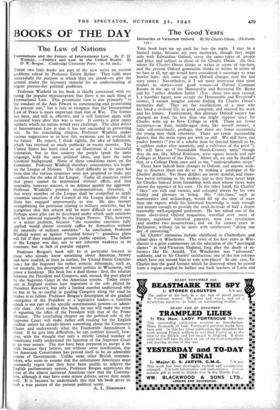BOOKS OF THE DAY
The Law of Nations
Foundations and the Future of International Law, By P. H. Winfield.—Politics and Law in the United States. By 13 W. Brogan. (Cambridge University Press. 3s. 6d. each.)
THESE two little books are part of the new series on current problems edited by Professor Ernest Barker. They fulfil most successfully the purpose at which they are aimed—to give the general reader the necessary material for an understanding of urgent present-day political problems.
Professor Winfield in his book is chiefly concerned with re- futing ttie popular misconception that there is no such thing as International Law. This pessimistic view is due primarily " to the conduct of the Axis Powers in commencing and prosecuting the present war," but it fails to recognise that the International Law of Peace is more important than that of War. The former has been, and still is, effective, and it will function again with increased force after this war is over. It covers a great many subjects which no nation would ever challenge. The chief defect of International Law is that it has not succeeded in preventing war. In 'his concluding chapter, Professor Winfield makes various suggestions as to how this weakness can be avoided in the future. He rejects, I think rightly, the idea of federation, which has received so much publicity in recent months. The United States has been cited as an illustration of a successful federation, but in that country the people speak the same language, hold the same political ideas, and have the same historical background. None of these conditions exists on the Continent. Professor Winfield therefore concentrates his hopes on the League of Nations. The chief difficulty in the past has been that the various countries were not prepared to make any sacrifices for the sake of the League. Today all countries realise that peace cannot be maintained without effort, and that neutrality, however' sincere, is no defence against the aggressor. Professor Winfield's primary recommendation, therefore, is that every member of the League shall be compelled to apply economic sanctions if the Council of the League decides that a State has engaged unnecessarily in war. He also favours strengthening the provision relating to military sanctions, but he recognises that this reform will be more difficult to carry out. Perhaps some plan can be developed under which such sanctions will be enforced regionally by the larger Powers. This, however, is a minor problem, because " the economic sanctions fully applied would almost certainly suffice by themselves without the necessity of military sanctions." In conclusion, Professor Winfield warns us against "hustled history ": grandiose plans will fail if they outdistance genuine public opinion. The failure of the League was due, not to any inherent weakness in its structure, but to lack of popular support.
Professor Brogan's book will be of particular interest to those who already know something about American history and have studied, at least in outline, the United States Constitu- tion ; for the beginner his rather esoteric references, such as, for example, his description of recent politics in Wisconsin, will prove a handicap. His book has a dual theme : first, the relation between the President and Congress, and, second, the part played by the Supreme Court in the American system. Today every- one in 'England realises how important is the role played by President Roosevelt, but only a limited number understand why he has to be so careful in guiding Congress along the road he wishes it to follow. Professor Brogan's description of the gradual emergence of the President as a legislative leader—a function which is not part of his specific constitutional powers—is admir- ably dear. After reading this book, no one will make the error of equating the office of the President with that of the Prime Minister. The concluding chapter on the political role of the Supreme Court will make rather stiff reading for the English student unless he already knows something about the Commerce Clause and understands what the Fourteenth Amendment is about. If he gets into difficulties, he can comfort himself, how- ever, with the thought that only a strictly limited number of Americans really understand the function of the Supreme Court or its true nature. The rest have been prepared to accept it on faith because they believe, not without some justification, that the American Constitution has proved itself to be an admirable system of Government. Unlike some other British commen- tators, who seem to assume that the unfortunate Americans must necessarily regret that they have been unable to achieve the English parliamentary system, Professor Brogan appreciates the force of the almost universal American view that the Constitu- tion, although it may have some minor defects, serves their needs well. It is because he understands this that his book gives us such a true picture of the present political scene. A. L. GOODHART.






















 Previous page
Previous page